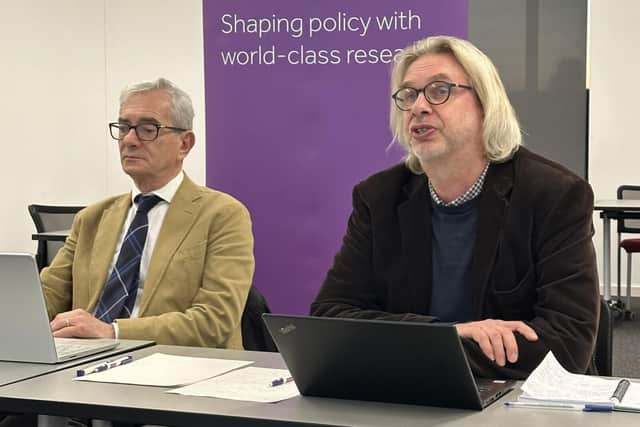Sleep crisis in North West discussed in Westminster and University of Manchester
and live on Freeview channel 276
Organised by the All-Party Parliamentary Group (APPG) for Sleep with support from Policy@Manchester, the hybrid event attended by politicians, clinicians, employers, trade unions and others took place in Portcullis House in Westminster and at The University of Manchester’s Oxford Road campus.
The meeting concluded with agreement on a five-point action plan for the North West which includes calls for improved access to cognitive behavioural therapy for insomnia (CBTi) for first line treatment, better public information on the types of sleep disorders and their prevention, and greater access for clinicians to sleep treatment and management options for their patients.
Advertisement
Hide AdAdvertisement
Hide AdThe impressive line-up of speakers included two leading academics from The University of Manchester - Pierluigi Cocco, Professor of Occupational Medicine, and Martie van Tongeren, Professor of Occupational and Environmental Health.


Their remarks included reflections on the how challenging working conditions such as night shifts, prolonged working hours and a “conflicting work environment” can impair sleep quality and quantity.
And they warned that sleep deprivation can harm cognitive performance, cause daytime drowsiness and negatively affect productivity.
Professor Pierluigi Cocco said: “We're not going to change the 24/7 society. Instead, we aim to suggest strategies to promote adaptation to it.
Advertisement
Hide AdAdvertisement
Hide Ad“These may include flexibility in shift schedules, the use of a dynamic indoor illumination to maximise melatonin inhibition during working hours, the possibility of taking short naps during a night shift and providing helpful information about sleep hygiene to employees.”
Professor Martie van Tongeren said: “Sleep quality is not just affecting our work and productivity, work can also have an important impact on sleep quality and duration. Work-related stress and shift work are major contributors to sleep problems, and we need to improve our understanding on how to adapt the way we work to encourage good sleep.
“With the Centre for Biological Timing and the Thomas Ashton Institute at The University of Manchester, we have developed a novel light sensor to investigate light patterns during the day and the impact that this has on sleep and levels of fatigue. We were pleased to be able to share this research with the members of the APPG.”
Jim Shannon MP, Chair of the APPG for Sleep, said: “Sleep disorders are all too common right across the United Kingdom, but the problem is particularly prevalent in the North West of England which is why this meeting was so useful.
Advertisement
Hide AdAdvertisement
Hide Ad“The experts taking part in our wide-ranging discussion were incredibly impressive including Professor Pierluigi Cocco and Professor Martie Van Tongeren from The University of Manchester which has produced some really valuable research in this important subject area.
“Their insights on the potential for shift work to become a major contributor to chronic insomnia - therefore impacting on the ability to work - were particularly informative.
“They also made a number of clear policy recommendations for employers and unions to help improve the situation, which I hope will be acted upon.”